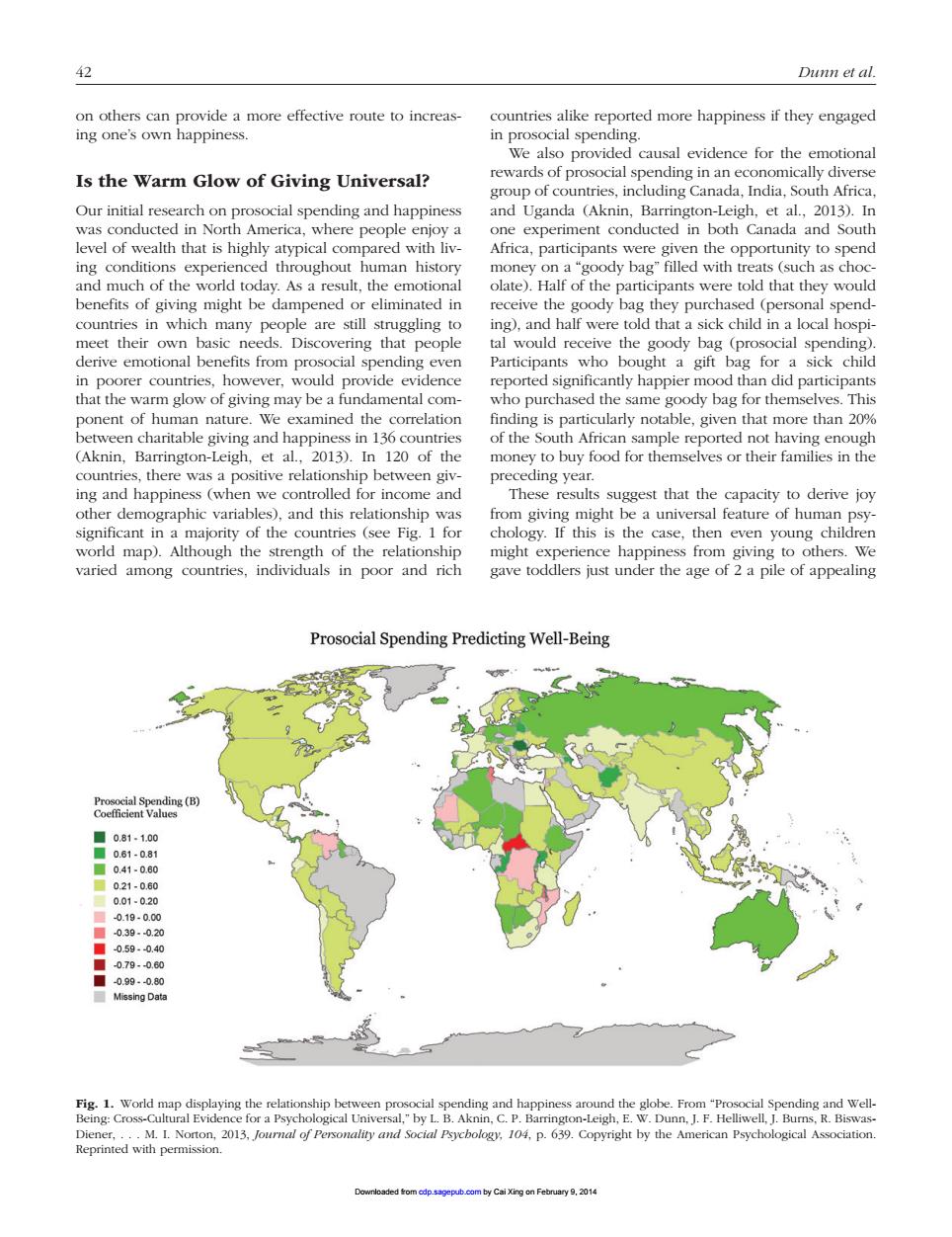正在加载图片...

42 Dunn et al. on others can provide a more effective route to increas- countries alike reported more happiness if they engaged ing one's own happiness. in prosocial spending. o provide d causal evidence for the emotiona Is the Warm Glow of Giving Universal? rew Our initial research on prosocial spending and happiness and Uganda (Aknin,Barrington-Leigh,et al.,2013).In was conducted in North America,where people enjoy a one experiment conducted in both Canada and South level of wealth that is highly atypical compared withliv Africa,participant Half of the as c told that th benefits of giving might be dampened or eliminated in receive the goody bag they purchased (personal spend- countries in which many people are still struggling to people s from prosoc s ad reme teppendima). ng ven that the warm glow of giving may he a fundamental com ponent of human nature.We examined the correlation finding is particularly notable.given that more than 20% ween charitable giving and happiness in 13 untries ngton-Leigl 013 120 ing and happiness (when we controlled for income and These results suggest that the capacity to derive joy other demographic variables).and this relationship was the among and rich the age appea Prosocial Spending Predicting Well-Being en( ■08110 041 e 030 079 Missing Dat42 Dunn et al. on others can provide a more effective route to increasing one’s own happiness. Is the Warm Glow of Giving Universal? Our initial research on prosocial spending and happiness was conducted in North America, where people enjoy a level of wealth that is highly atypical compared with living conditions experienced throughout human history and much of the world today. As a result, the emotional benefits of giving might be dampened or eliminated in countries in which many people are still struggling to meet their own basic needs. Discovering that people derive emotional benefits from prosocial spending even in poorer countries, however, would provide evidence that the warm glow of giving may be a fundamental component of human nature. We examined the correlation between charitable giving and happiness in 136 countries (Aknin, Barrington-Leigh, et al., 2013). In 120 of the countries, there was a positive relationship between giving and happiness (when we controlled for income and other demographic variables), and this relationship was significant in a majority of the countries (see Fig. 1 for world map). Although the strength of the relationship varied among countries, individuals in poor and rich countries alike reported more happiness if they engaged in prosocial spending. We also provided causal evidence for the emotional rewards of prosocial spending in an economically diverse group of countries, including Canada, India, South Africa, and Uganda (Aknin, Barrington-Leigh, et al., 2013). In one experiment conducted in both Canada and South Africa, participants were given the opportunity to spend money on a “goody bag” filled with treats (such as chocolate). Half of the participants were told that they would receive the goody bag they purchased (personal spending), and half were told that a sick child in a local hospital would receive the goody bag (prosocial spending). Participants who bought a gift bag for a sick child reported significantly happier mood than did participants who purchased the same goody bag for themselves. This finding is particularly notable, given that more than 20% of the South African sample reported not having enough money to buy food for themselves or their families in the preceding year. These results suggest that the capacity to derive joy from giving might be a universal feature of human psychology. If this is the case, then even young children might experience happiness from giving to others. We gave toddlers just under the age of 2 a pile of appealing Fig. 1. World map displaying the relationship between prosocial spending and happiness around the globe. From “Prosocial Spending and WellBeing: Cross-Cultural Evidence for a Psychological Universal,” by L. B. Aknin, C. P. Barrington-Leigh, E. W. Dunn, J. F. Helliwell, J. Burns, R. BiswasDiener, . . . M. I. Norton, 2013, Journal of Personality and Social Psychology, 104, p. 639. Copyright by the American Psychological Association. Reprinted with permission. Downloaded from cdp.sagepub.com by Cai Xing on February 9, 2014